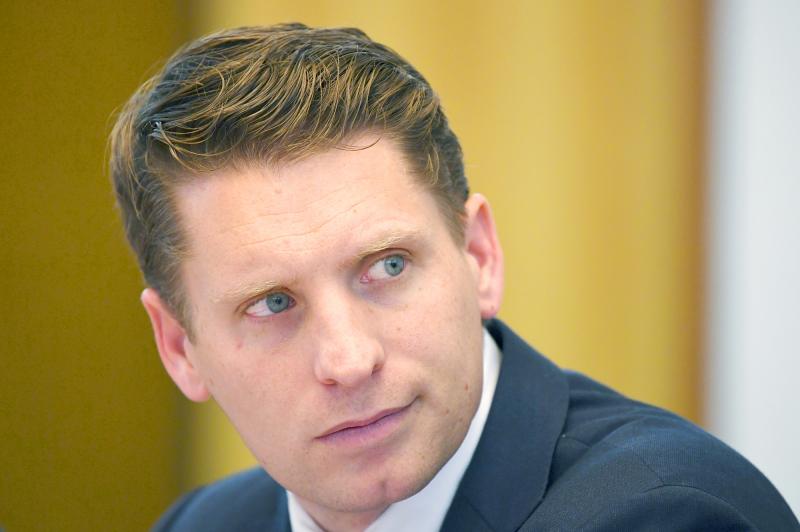Australian Shadow Minister for Defence Andrew Hastie yesterday called for Australia to develop and operate its own missiles, saying that the era of the “lucky country” is over.
Hastie said that Australia needs greater deterrents given the “very bleak” strategic outlook, with a “rising China” displaying “revisionist and expansionist ambitions.”
China launched ballistic missiles during live-fire exercises near Taiwan following US House of Representatives Speaker Nancy Pelosi’s visit to the nation earlier last week.

Photo: EPA-EFE
Hastie, who was Australian assistant minister for defence before the coalition government lost office in May, told Australian Broadcasting Corp’s Insiders the missile launch demonstrated that China was using its “strategic bulk to force a sphere of influence.”
He said that Australia needed more fuel stocks, more ammunition, investment in cybercapabilities, nuclear submarines through the AUKUS alliance with the UK and US, to “hold adversaries ... at distance,” and missiles that can “reach out and touch an adversary.”
“I think we need to partner more closely with the US, with the UK ... on missiles — they’re a critical partner,” he said.
Hastie said he was not referring to allowing the US to base long-range missiles in Australia, but rather that “we need to partner to develop our own sovereign missiles ... Australian-owned, Australian-delivered, if required.”
Australia would cover the capability gap before it acquires nuclear submarines with an extension of the Collins-class submarines, which are still “regionally superior,” Hastie said.
“Richard Marles as defense minister needs to be focused on delivering those [nuclear] submarines as quickly as possible,” he added.
Australia needs to “continue to engage with China and Taiwan ... because the last thing we want is miscalculation,” Hastie said.
Hastie said as a “general principle” Australia must be prepared to defend its neighbors, because if it does not stand up for other countries, “who will stand up for [us]?”
“As a nation of only 26 million people on a vast continent, we need as many friends [as] we can get. In fact, I would say the era of the lucky country is over,” he said.
If conflict over Taiwan were to eventuate, “whether we are involved directly or indirectly on the periphery, we would certainly be in the gun, and that’s why we need to build our deterrence strength,” he said.
He said he would “like to visit Taiwan at some point,” adding that he had already been invited.

The Ministry of the Interior (MOI) is to tighten rules for candidates running for public office, requiring them to declare that they do not hold a Chinese household registration or passport, and that they possess no other foreign citizenship. The requirement was set out in a draft amendment to the Enforcement Rules of the Public Officials Election and Recall Act (公職人員選舉罷免法 ) released by the ministry on Thursday. Under the proposal, candidates would need to make the declaration when submitting their registration forms, which would be published in the official election bulletin. The move follows the removal of several elected officials who were

The Republic of China (ROC) is celebrating its 114th Double Ten National Day today, featuring military parades and a variety of performances and speeches in front of the Presidential Office in Taipei. The Taiwan Taiko Association opened the celebrations with a 100-drummer performance, including young percussionists. As per tradition, an air force Mirage 2000 fighter jet flew over the Presidential Office as a part of the performance. The Honor Guards of the ROC and its marching band also heralded in a military parade. Students from Taichung's Shin Min High School then followed with a colorful performance using floral imagery to represent Taiwan's alternate name

FOUR DESIGNATED AREAS: Notices were issued for live-fire exercises in waters south and northwest of Penghu, northeast of Keelung and west of Kaohsiung, they said The military is planning three major annual exercises across the army, navy and air force this month, with the navy’s “Hai Chiang” (海強, “Sea Strong”) drills running from today through Thursday, the Ministry of National Defense said yesterday. The Hai Chiang exercise, which is to take place in waters surrounding Taiwan, would feature P-3C Orion maritime patrol aircraft and S-70C anti-submarine helicopters, the ministry said, adding that the drills aim to bolster the nation’s offshore defensive capabilities. China has intensified military and psychological pressure against Taiwan, repeatedly sending warplanes and vessels into areas near the nation’s air defense identification zone and across

A Chinese takeover of Taiwan would severely threaten the national security of the US, Japan, the Philippines and other nations, while global economic losses could reach US$10 trillion, National Security Council Deputy Secretary-General Lin Fei-fan (林飛帆) wrote in an article published yesterday in Foreign Affairs. “The future of Taiwan is not merely a regional concern; it is a test of whether the international order can withstand the pressure of authoritarian expansionism,” Lin wrote in the article titled “Taiwan’s Plan for Peace Through Strength — How Investments in Resilience Can Deter Beijing.” Chinese President Xi Jinping’s (習近平) intent to take Taiwan by force